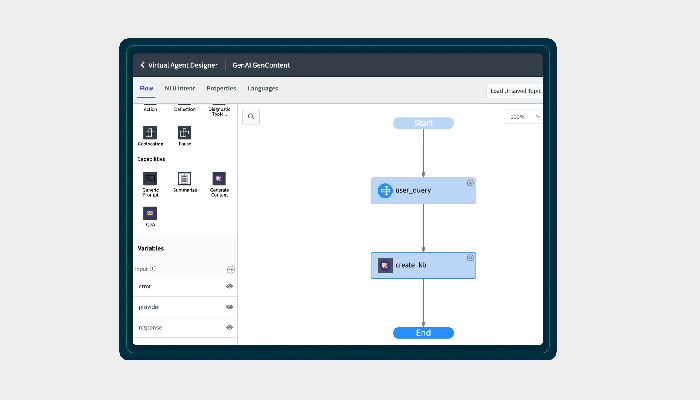Configurable in low-code, latest generative AI capability offers fast, more relevant answers in the Virtual Agent chatbot to help increase productivity without adding complexity
ServiceNow announced its newest generative AI solution, Now Assist for Virtual Agent, designed to create truly conversational experiences for more intelligent self-service. Now Assist for Virtual Agent builds on ServiceNow’s strategy to embed generative AI across the Now Platform so customers can easily harness intelligence at scale and simplify and optimize digital workflows, as announced recently at ServiceNow’s signature Knowledge event.
“ServiceNow is leading the intelligence era. Years of AI investment have put us at the center of an undeniable movement,” said ServiceNow Chairman and CEO Bill McDermott. “We’re building generative AI into our platform so customers can maximize their ROI: ‘return on intelligence.’ This is all about thoughtful, high-trust co-innovation as we find the balance between machine speed and human judgment. Enhanced by our strategic partnerships with NVIDIA and Microsoft, we are engineering smarter, fully automated workflows. We help our customers innovate completely new business models on ServiceNow as the intelligent platform for end-to-end digital transformation.”
Now Assist for Virtual Agent uses generative AI to deliver more direct, relevant, and conversational responses to questions—and to connect exchanges to digital workflows across the Now Platform. For example, if a user asks Now Assist for Virtual Agent a question, the solution will use generative AI to provide a straightforward answer within the conversation that helps users immediately get the information they need—such as internal pieces of code for product and engineering teams, product images or videos, links to documents, or summaries of relevant knowledge base articles. Because ServiceNow works across departments and systems, Now Assist for Virtual Agent converses accurately even if the user doesn’t know who to ask or where to start, which helps increase productivity, creates higher self-solve rates, and drives faster issue resolution.
“Now Assist for Virtual Agent is a powerful organic complement to the generative AI capabilities ServiceNow has already started to roll out,” said CJ Desai, president and chief operating officer at ServiceNow. “By embedding generative AI into the Now Platform, we are empowering our customers to radically improve productivity and realize the true potential of enterprise-grade AI.”
With Now Assist for Virtual Agent, customers will also be able to:
- Easily configure intelligent conversational experiences powered by generative AI from Virtual Agent in a low-code, drag-and-drop environment with Virtual Agent Designer
- Embed direct access to general purpose large language models (LLMs), such as Microsoft Azure OpenAI Service LLM or OpenAI API, allowing end-users to safely supplement general answers as needed without having to scour through multiple knowledge base articles to find the right information
- Receive direct responses to user questions in real-time conversations, with information formatted to best suit the answer (i.e., text, links, images, videos, relevant portions of knowledge base articles)
- Achieve a more personalized, relevant, and contextual self-service experience from Virtual Agent
Now Assist for Virtual Agent is powered by the recently announced ServiceNow Generative AI Controller, which serves as the foundation for all generative AI functionality on the Now Platform. The Controller allows organizations to easily connect ServiceNow instances to both Microsoft Azure OpenAI Service LLM and OpenAI API and features built-in actions for faster intelligent workflow automation. Now Assist for Virtual Agent also leverages Now Assist for Search, which sits on top of the Controller and works with Now Assist for Virtual Agent to provide connected generative AI experiences across the Now Platform. Because Now Assist for Search pulls information from within a customer’s environment, customers can trust that robust security layers are applied within the Now Platform so results can be more accurate, helping to reduce the likelihood of error or hallucinations.
“We are seeing extraordinarily rapid growth in organizations exploring potential use cases for generative AI in the enterprise,” said Neil Ward-Dutton, vice president, AI, Automation and Analytics Europe, IDC. “Use cases relating to customer and employee experience improvement, together with knowledge management, are among those at the top of the list for those organizations making the earliest moves. Generative AI advances are ushering us towards a future in which AI-powered capabilities are woven into processes, decisions, products, services, and experiences of all kinds.”
Scaling the power of generative AI across the Now Platform
ServiceNow has been investing in AI for years, embedding it into the Now Platform to simplify and optimize digital workflows right out-of-the-box. Other recently announced generative AI innovations from ServiceNow include a partnership with NVIDIA to develop custom LLMs for workflow automation, and additional features that apply generative AI to use cases across IT departments, customer service teams, employees, and developers. Additionally, along with its partner, Hugging Face, and on behalf of the BigCode community, ServiceNow announced the availability of the open-access, open-science, open-governance 15 billion parameter StarCoder LLM for code, enabling responsible innovation at scale with more transparent and accessible generative AI.
Availability
Now Assist for Virtual Agent and Now Assist for Search are available to a limited set of customers now and are expected to be generally available in ServiceNow’s Vancouver release, coming in September 2023.


